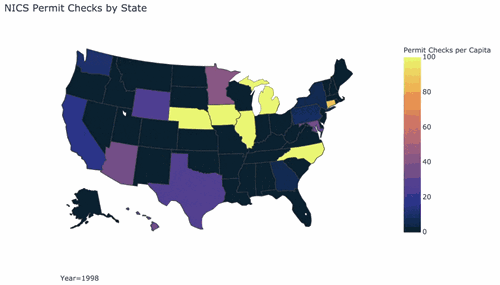We write about NICS numbers regularly because they provide a ready-made finger on the pulse of American gun owners. As we saw last year, NICS numbers confirm what we’re all thinking. Politicians talking about banning commonly owned firearms? NICS numbers rise. Bureaucrats releasing prisoners as a virus rages? NICS numbers rise. Readers know the rest. Self-reliance and firearms ownership are time-honored American traditions.
We usually look at NICS numbers on a month-to-month basis. We’d say something about how the NICS office conducted 3,514,070 total checks last month. We talk about how the latest batch is the most ever for that calendar month (it was) or how it was an about 21% increase over April 2020. We’d note that there were 961,947 handgun-related checks, 549,244 long gun related checks, and 602,540 permit checks last month. That’s what we’ve done in past months, and we have quite a streak going. We’d try to put those massive numbers into context.
That’s an increasingly difficult task, as each month brings several million more NICS checks. Readers, and the public in general, may become conditioned to these large numbers. That, when taken in conjunction with a media framing any month-to-month decrease as symbolic of a declining gun culture, presents a problem.
So let’s look at the numbers differently. First, the necessary caveats. Not every NICS check results in a sale. Twenty-four states allow permit holders to purchase a firearm from a dealer without a NICS check (based on their permit status). Now let’s look at the overall growth of NICS checks since the system came online by looking at the total number of checks run to date each month since November 1998.
There have been 388,665,770 total NICS checks – of all types – since the system went live. The U.S. Census Bureau recently reported that the total population was 331,449,281 as of April 1, 2020. The number of NICS checks conducted since November 1998 is 17% higher than the most recently reported U.S. population.
NICS checks related to long guns started off high. Handgun-related and permit checks started to narrow the gap in the spring of 2016. The line chart below really demonstrates the difference in rates well. Note the significant shift in the slope of the handgun and permit related checks; Americans exercising their right to keep and bear arms – emphasis on the bearing piece – present a clear example of bending the curve upwards.
Long gun related checks, on the other hand, represent a nearly perfectly linear upward trend through the history of NICS. This category includes bolt action rifles, shotguns, and semi-auto rifles – including America’s rifle, the AR-15 and its variants.
Let’s take a closer look at permits. Permit data, especially early permit data, is limited by both the availability of permits and the near-constant run of permit checks in some states. Some states would check as many existing permits in a year as they could. NICS later added a “recheck” category which helped alleviate some of the visual imbalance between states, but we have to work with the data we have. The map below shows the rate of permits-related NICS checks per 100,000 total population per state since NICS went live.

Nearly every state moves into the yellow on the color scale, indicating a higher rate of permit-related NICS checks per capita, by 2018. This is only federal NICS data and so the states that use internal systems to process permits are not represented.
The key takeaway, of course, is that the number of law-abiding Americans keeping and bearing arms is growing. Our community is growing, even while President Biden and Vice President Harris work to claim to the mantle of most anti-gun Administration in history. Out of touch politicians are, well, out of touch.
The American people are not out of touch. The continued high pace of NICS checks – we’re a third of the way through 2021 and have already conducted 40% of the total NICS checks run last year – shows that this was not a fleeting surge. Remember, firearms are durable goods. They are not typically disposable. The continued growth in the gun owning community shows that law-abiding Americans will continue to exercise their right to keep themselves and their loved ones safe and to engage in the shooting sports.
It is an American tradition.













 More Like This From Around The NRA
More Like This From Around The NRA







